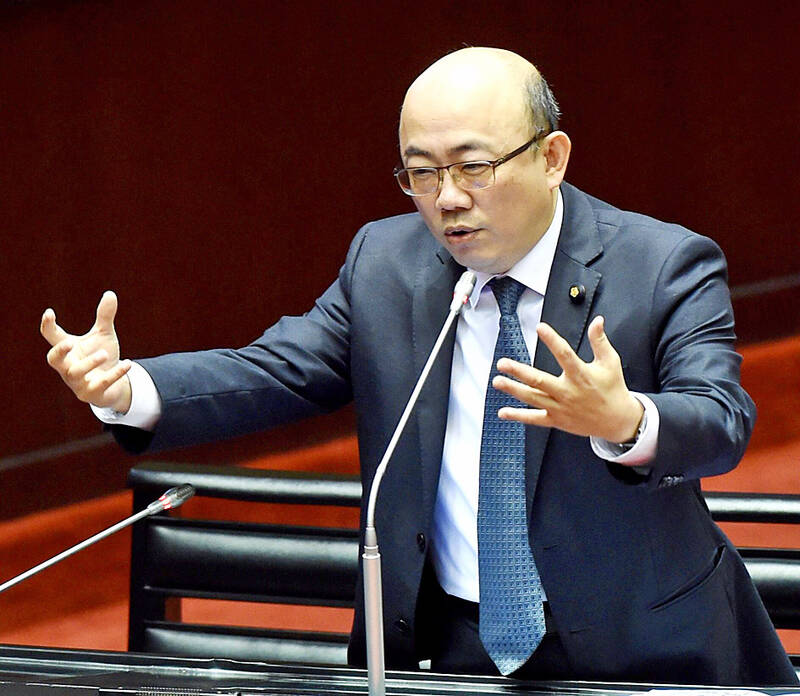The Democratic Progressive Party’s (DPP) Central Evaluation Committee on Thursday expelled 50 party members, including former legislator Julian Kuo (郭正亮) and agricultural blogger Lin Yu-hung (林裕紘).
The committee said in a statement that the 50 expelled party members either contravened party rules by campaigning for other political parties during elections or were involved in #MeToo sex scandals. It added that although some had announced they were withdrawing from the DPP, the disciplinary committee still needed to officially revoke their memberships.
The unanimous decision by the committee to expel the members was made following discussions about their conduct in the 2022 local elections and this year’s presidential and legislative elections, the committee said.

Photo: Chien Jung-feng, Taipei Times
Kuo, one of the former high-profile DPP lawmakers to get the boot, is known for his harsh criticism of the party on various political TV shows. Kuo announced his withdrawal from the DPP in May last year, saying he had gradually moved away from the party.
Lin, another well-known party member, was kicked out after being accused of enlisting people to send him hoax death threats amid controversies related to a government-funded egg import program last year.
In addition, Hung Chih-kun (洪智坤), Tsai Mu-lin (蔡沐霖) and Chen Yu-hao (陳右豪) were expelled for their alleged involvement in sexual misconduct scandals.
Meanwhile, Chou Yu-hsiu (周榆修), a former aide to DPP lawmaker Su Chiao-hui (蘇巧慧) and the ex-deputy head of the party’s youth branch, who was nominated by the Taiwan People’s Party as one of its legislator-at-large candidates in this year’s elections, was also kicked out.
In addition to the 50 expelled party members, the disciplinary committee also decided to suspend the memberships of 37 party members for a year.
Committee chairman Lai Jui-lung (賴瑞隆) said the country is facing a new set of challenges after the Jan. 13 presidential election, so the party has zero tolerance for those who contravenes party rules.
Lai urged party members to take note of the party platform and unite in the fight to safeguard Taiwan’s freedom, democracy, peace and prosperity.

Taiwan yesterday condemned the recent increase in Chinese coast guard-escorted fishing vessels operating illegally in waters around the Pratas Islands (Dongsha Islands, 東沙群島) in the South China Sea. Unusually large groupings of Chinese fishing vessels began to appear around the islands on Feb. 15, when at least six motherships and 29 smaller boats were sighted, the Coast Guard Administration (CGA) said in a news release. While CGA vessels were dispatched to expel the Chinese boats, Chinese coast guard ships trespassed into Taiwan’s restricted waters and unsuccessfully attempted to interfere, the CGA said. Due to the provocation, the CGA initiated an operation to increase

CHANGING LANDSCAPE: Many of the part-time programs for educators were no longer needed, as many teachers obtain a graduate degree before joining the workforce, experts said Taiwanese universities this year canceled 86 programs, Ministry of Education data showed, with educators attributing the closures to the nation’s low birthrate as well as shifting trends. Fifty-three of the shuttered programs were part-time postgraduate degree programs, about 62 percent of the total, the most in the past five years, the data showed. National Taiwan Normal University (NTNU) discontinued the most part-time master’s programs, at 16: chemistry, life science, earth science, physics, fine arts, music, special education, health promotion and health education, educational psychology and counseling, education, design, Chinese as a second language, library and information sciences, mechatronics engineering, history, physical education

The Chinese military has boosted its capability to fight at a high tempo using the element of surprise and new technology, the Ministry of National Defense said in the Quadrennial Defense Review (QDR) published on Monday last week. The ministry highlighted Chinese People’s Liberation Army (PLA) developments showing significant changes in Beijing’s strategy for war on Taiwan. The PLA has made significant headway in building capabilities for all-weather, multi-domain intelligence, surveillance, operational control and a joint air-sea blockade against Taiwan’s lines of communication, it said. The PLA has also improved its capabilities in direct amphibious assault operations aimed at seizing strategically important beaches,

‘MALIGN PURPOSE’: Governments around the world conduct espionage operations, but China’s is different, as its ultimate goal is annexation, a think tank head said Taiwan is facing a growing existential threat from its own people spying for China, experts said, as the government seeks to toughen measures to stop Beijing’s infiltration efforts and deter Taiwanese turncoats. While Beijing and Taipei have been spying on each other for years, experts said that espionage posed a bigger threat to Taiwan due to the risk of a Chinese attack. Taiwan’s intelligence agency said China used “diverse channels and tactics” to infiltrate the nation’s military, government agencies and pro-China organizations. The main targets were retired and active members of the military, persuaded by money, blackmail or pro-China ideology to steal